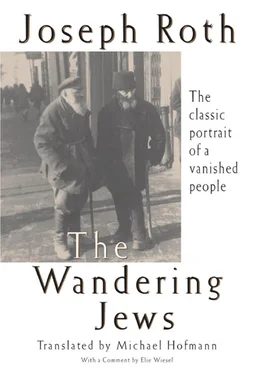I used the word “clandestinely” a while ago, and some readers may wonder: Where in all this is Joseph Roth? The answer is everywhere and nowhere, chiefly nowhere. We see him and feel him as an investigator, a “roving reporter,” a trustworthy and opinionated guide — but the book rigorously excludes anything avowedly personal. We don’t know that the little cruciform town in the swampy plains (described here for the first time, though it will appear later in Job, Weights and Measures, The Leviathan , and elsewhere) is Roth’s birthplace, the town of Brody in Galicia; that the Westward momentum of the book (and again, of much of Roth’s fiction) was also that of his life; that he had himself been through Vienna and Berlin, and at the time of writing, was in Paris (where he felt hap piest); that his father-in-law was an installment seller in Vienna, his uncle a tailor, and his grandfather a rabbi. Finally, nowhere does he even say he is a Jew! I don’t know why. Perhaps it was due to apprehension, or to leave himself the greatest possible freedom as he discussed the great variety of Jews, or simply because he was too proud to put his own vita , like a feather, on the scales. The temper of the times was not as mindlessly autobiographical as ours. Also, Roth, who loved mystification, had many different versions of himself to keep in the air. Whatever it is, the effect of so much passion and sympathy and insight being channeled through the third person is extremely odd. But it might help explain why the book seems to alternate between running freely and at times almost feeling blocked by so many things to say. There is something grimly appropriate that a book about the Jews in Europe should not accommodate its author.
Roth’s friend Bruno Frei, reviewing Flight Without End , contended that Roth had one flaw: He only saw, he was unable to believe. That would have been in 1927. In the last twelve years of his life, it seems to me that Roth was twice able to invest things with belief. One was Judaism, in the sense of a somewhat separate presence of Jews within and throughout and inspiriting Europe; the other, the Dual Monarchy of Austria-Hungary. Both were instances of something supranational, something that contained multitudes, something not exclusive and not ideal, and therefore free from bigotry and better and broader than the run of human institutions; something whose time was — or was almost — gone. With and from these, Roth made the tragically beautiful emblematic images of his great books. I would like to give two of these.
The first is not in a book, but is a story that David Bronsen, Roth’s biographer, informs us Roth liked to tell. An old caftaned Jewish refugee, sitting in a train compartment, shows his ticket to the inspector. The inspector, suspicious, thinking that perhaps he is hiding a child in his caftan to save the price of a ticket, asks the Jew what he has in there. The Jew produces a framed portrait of Emperor Franz Joseph. The second is a little scene from Job , the 1930 novel in which Roth takes on the subject matter he first explores in The Wandering Jews : “Mendel Singer was silent. He sat by the roadside, next to Same shkin. For the first time in his life, Mendel Singer sat on the naked earth, in the middle of the wild night, beside a peasant. [.] Suddenly Mendel began to sob. Mendel wept, in the midst of the strange night, next to Sameshkin. The peasant pressed his fists in his eyes, because he felt that he too would weep. Then he laid his arm around the thin shoulder of the Jew and said softly: “Sleep, dear Jew! Have a good sleep!”
— MICHAEL HOFMANN
March 2000

This book is not interested in the plaudits and endorsements, much less the cavils or criticisms of those who despise, hate, and persecute the Eastern European Jews. It does not address itself to those Western Europeans who, by virtue of the fact that they grew up with elevators and flush toilets, allow themselves to make bad jokes about Romanian lice, Galician cockroaches, or Russian fleas. This book is not interested in those “objective” readers who peer down with a cheap and sour benevolence from the rickety towers of their Western civilization upon the near East and its inhabitants; who, out of sheer humanity, are struck with pity at inadequate sewage systems, and whose fear of contagion leads them to lock up poor immigrants in tenements where social problems are solved by simple epidemics. This book does not want to be read by those who would seek to deny their own fathers or forefathers if they happened to escape from such tenements. This book has not been written for readers who would blame the author for treating the subjects of his account with love, and not with that “scientific detachment” better known as indifference.
So, for whom is this book?
The author has the fond hope that there may still be readers from whom the Eastern Jews do not require protection: readers with respect for pain, for human greatness, and for the squalor that everywhere accompanies misery; Western Europeans who are not merely proud of their clean mattresses. These are readers who feel they might have something to learn from the East, and who have perhaps already sensed that great people and great ideas — great but also useful (to them) — have come from Galicia, Russia, Lithuania, and Romania; ideas that would help shore up and expand the firm foundations of Western civilization. These are readers who have already perceived that these “visitors from the East”—as the local news report, the meanest product of Western Europe, likes to call them — are not just pickpockets.
This book will unfortunately not be able to treat the problem of Eastern Jewry with the comprehensiveness and thoroughness that it needs and deserves. It will only try to describe the human beings who constitute the problem, and the circumstances that cause it. It will report only on parts of a huge mass of material that, to be dealt with in its entirety, would demand of the author personally as many wanderings as have been suffered by several entire generations of Eastern Jews.
E ASTERN E UROPEAN J EWS IN THE W EST

The Eastern Jew in his homeland knows nothing of the social injustice of the West; nothing of the habitual bias that governs the actions, decisions, and opinions of the average Western European; nothing of the narrowness of the Western perspective, jagged with factory smokestacks and framed by power plants; nothing of the sheer hatred that, like a life-prolonging (though lethal) drug, is so powerful that it is tended like a sort of Eternal Flame, at which these selfish people and nations warm themselves. The Eastern Jew looks to the West with a longing that it really doesn’t merit. To the Eastern Jew, the West signifies freedom, justice, civilization, and the possibility to work and develop his talents. The West exports engineers, automobiles, books, and poems to the East. It sends propaganda soaps and hygiene, useful and elevating things, all of them beguil ing and come-hitherish to the East. To the Eastern Jew, Germany, for example, remains the land of Goethe and Schiller, of the German poets, with whom every keen Jewish youth is far more conversant than our own swastika’d secondary school pupils. In the course of the War the Eastern Jew was lucky enough to come across the general who issued a high-sounding proclamation to the Polish Yids— drafted for him by his press department — not that other general who never read a single work of literature but managed to lose the war, just the same.
Читать дальше














